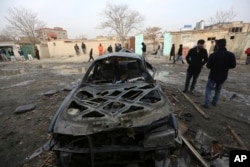The United States on Monday renewed its appeal to the Taliban to join peace talks and said Afghan and U.S. forces would have to prepare themselves for the prospect of increased violence in the spring and summer if the insurgent group did not agree to negotiations.
The Taliban said on Saturday it would not take part in peace talks brokered by representatives of Afghanistan, Pakistan, China and the United States, casting doubt on efforts to revive negotiations.
State Department spokesman John Kirby said the United States backed a call by Afghan President Ashraf Ghani for the radical Islamists to join talks with the Kabul government.
"They have a choice. Rather than continuing to fight their fellow Afghans and destabilizing their country, they should engage in a peace process and ultimately become a legitimate part of the political system of a sovereign united Afghanistan," Kirby said.
"There is and should be a sense of urgency around getting these talks up and running," he told a regular news briefing. "If there's no peace process in place and the Taliban's not willing to come to the table and talk about a reconciliation ... we would and the Afghan security forces would have to prepare themselves for the potential for increased violence in the spring and summer months.
"It's the so-called fighting season, and we've seen this before, when the weather warms up. ... I want to stress that's not what we want to see," he added.
The Taliban, ousted from power in a U.S.-led military campaign in 2001, has been waging a violent insurgency to try to topple Afghanistan's Western-backed government.
Following a meeting of the so-called Quadrilateral Coordination Group in February, officials said they expected direct peace talks between the Afghan government and the Taliban to begin in early March.
A previous peace effort broke down last year following the announcement that the Taliban's founder and longtime leader, Mullah Mohammed Omar, had died about two years earlier.
New leader Mullah Akhtar Mansour has laid down conditions for taking part in any talks as he struggles to overcome factional infighting, with some breakaway groups opposing any negotiations.
Heavy fighting has continued over the winter from Helmand in the south to Jowzjan province in the north, while suicide attacks have been launched in the capital, underlining the difficulty of restarting the peace process.












